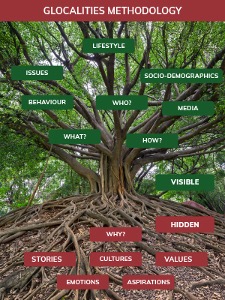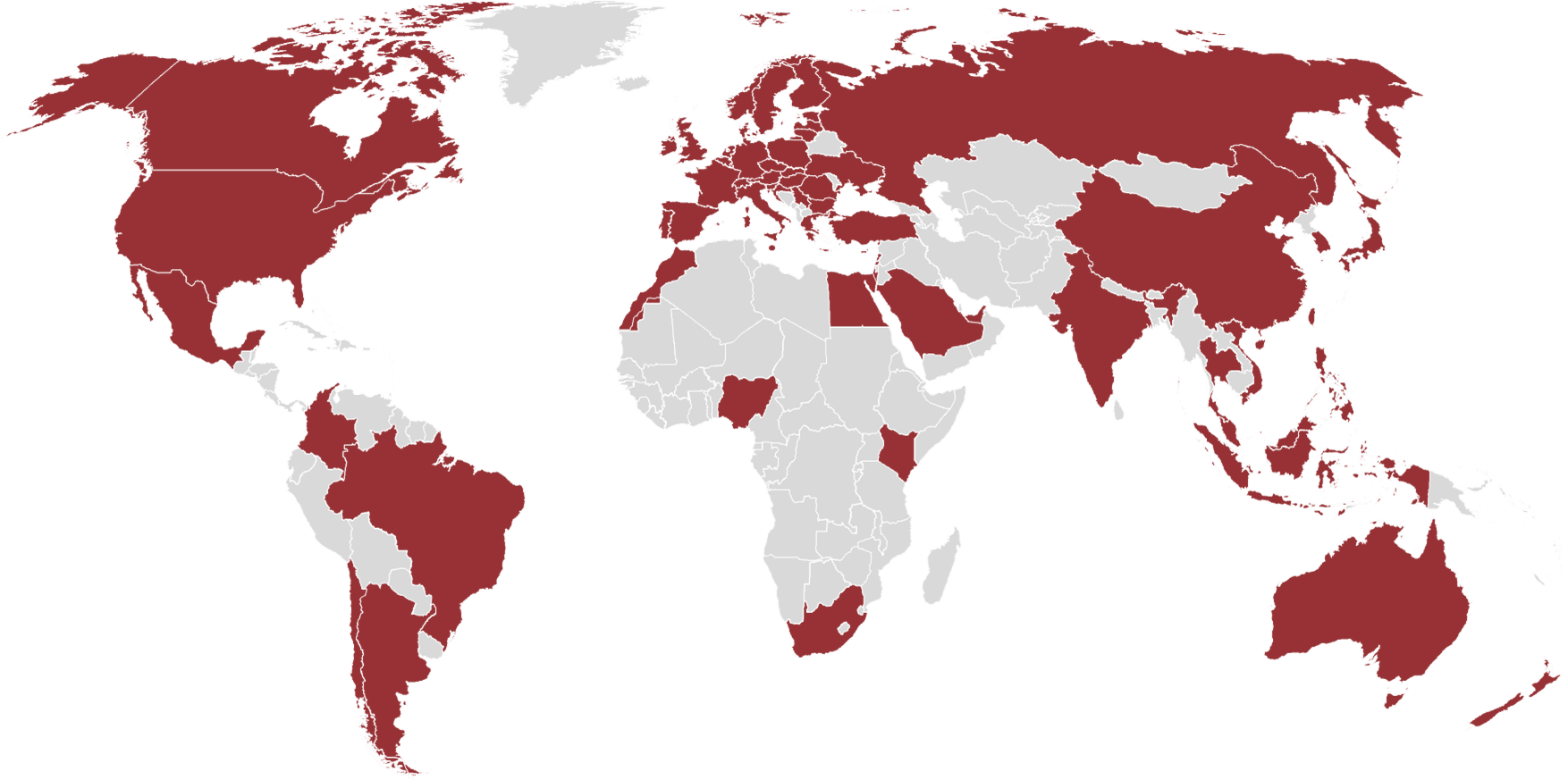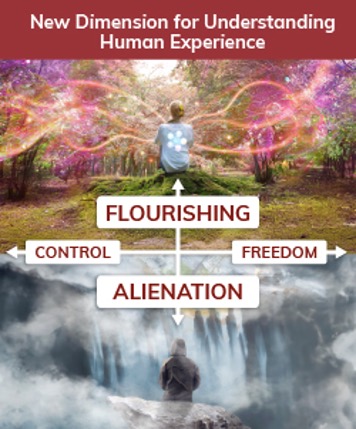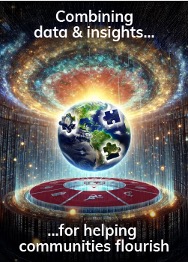In our quest to learn from global communities and support those living greatly in Charlotte and beyond, we have partnered with Glocalities, an Amsterdam (Netherlands) based international research agency renowned for its cross-cultural research into behavioral psychology and values. Through this partnership, we aim to explore new ways to bridge cultural divides and foster connections that unite us. I had the opportunity to sit down with Martijn Lampert, co-founder and research director at Glocalities, to delve into their unique approach and the insights they are uncovering.

The essence of Glocalities is captured in its name, highlighting the universal pursuit to comprehend and navigate the interconnectedness between macro and micro levels, as well as the ties between the inner and outer realms of life, such as values and behaviors. I hold the poet Rumi in high regard for his advice to “Work in the invisible world at least as hard as you do in the visible.” Through empirical research combining patterns of meaning that are often hidden from view with behaviors, we aim to help unlock the latent potential for growth in individuals, communities, organizations and societies. This integrated research approach is crucial for understanding the human experience. By delving deeper, we help our clients seize connection opportunities, strengthen resilience, and prepare for the future.
The Glocalities methodology has been developed and refined over decades and enables us to delve deeper, zoom in and out, and offer insights into questions and topics that are critical for our clients. The resulting insights, used for strategy, communications, policy, and leadership development, are interwoven with values and patterns of meaning, offering our clients renewed perspectives and agency in their areas of focus. This approach equips them to effectively manage the complex interactions between topics and people, considering trends, cultural dynamics and diverse population segments.

Our research also highlights the challenges faced by the United States in an international context. Last year, in collaboration with Reuters, we released an analysis on global trends, polarization, and the widening gender gap among young people. New York Times columnist Nicholas Kristof wrote about our findings, mentioning the American Institute for Boys and Men, which led to the connection with the Gambrell Foundation. In our first meeting, it became clear that the Gambrell Foundation focuses on the same topics as we do and was about to embark on an expedition to Amsterdam. This serendipitous alignment sparked our collaboration.
To understand my research focus on flourishing and alienation, it’s relevant to share a bit more of my personal journey. Since I was young, I’ve had an insatiable curiosity, always eager to ask questions. My passion for understanding and fostering flourishing was sparked by my grandparents, who owned a nursery and worked closely with the earth and the seasons to cultivate vegetables. This early experience ignited a profound respect in me for nurturing growth by harnessing the sprouting impulse of seeds, creating optimal conditions, and aligning with natural cycles. This later evolved into a curiosity about purpose, human behavior, values, faith and wisdom traditions from around the world, and the cycles of transformation.
Over the years, this curiosity contributed to the international Glocalities research program, that we have developed in collaboration with our sister company Motivaction and clients. My university graduation thesis already explored the interplay between the Greek gods Dionysos and Apollo in current-day culture, highlighting polarizing and ever-evolving themes of chaos and order, emotion and reason, and freedom and control. This empirical values research revealed how polarities and values manifest in daily life, in lifestyles and society in a multitude of forms, contributing to both disintegration, tension, and conflict and renewed opportunities for growth, alignment and coherence.

Since the late nineties, I’ve conducted empirical values research into patterns of meaning, expanding globally with the Glocalities research program during the last decade. Collaborating with and learning from the late professor Ronald Inglehart — founder of the World Values Survey — in the last 2 years of his life, I focused on researching polarization. By integrating his measures of social change into our tools and methodology, we examined ideological and political polarization within and across 25 countries, using the rich Glocalities surveys as a source. We highlighted how societies can become stuck in polarization, making the research timely. Building further on this experience, during the pandemic, we researched social shifts influenced by existential insecurity, isolation, cultural backlash, and rising fear. Although saddened by Professor Inglehart’s passing, his advice and encouragement inspired me to delve deeper into the structuring principles of our time and the turbulent period ahead. How can we address polarization in healthy ways, avoiding regressive trends and further division? What insights can we gain from the Glocalities research in this regard? I continued to explore patterns in the data while drawing on learnings from wisdom traditions. Based on this, I developed measures on alienation and flourishing and added these to our international waves of fieldwork. Now, we have the data already available for 29 countries. And, with the support of Gambrell Foundation, I am preparing a first and timely publication of the findings on the topic.

The Alienation-Flourishing dimension offers a framework that is fundamental for understanding how people experience the world and their place in it. Alienation is marked by feelings of disintegration, isolation, and meaninglessness, while flourishing is marked by purpose fulfillment, coherence, and feelings of wholeness and connection. Flourishing correlates with hope, positive emotions, trust, and enthusiasm. Meanwhile, alienation is linked to existential distress, stagnation, and crisis, correlating with anxiety, distrust, fear, and hostility. When people feel alienated, they are ‘’out of tune.’’ They feel drained, isolated, and disconnected from their heart’s desire, while people who flourish are filled with purpose, enthusiasm, and positive emotions. This intrinsically human dimension, which is relevant across countries and ideological divides, is partly related to economic experiences, lifestyle, health, social relations, human connection, and online behavior.
The Alienation-Flourishing dimension is naturally linked to the theme of living a great life and understanding it more deeply as a structuring principle can help propel the world forward toward more fulfilling lives. The research aligns with the Gambrell Foundation’s focus on human connection, purpose, resilience, curiosity, and living greatly. It offers fresh insights and opens new perspectives that I am currently exploring based on the research data for the US and globally.
Resilience can be found in healthy ways of navigating the Alienation-Flourishing dimension at individual, communal, and societal levels. Coping with difficult circumstances while maintaining course in relation to purpose is crucial in modern life, where distractions are abound, and attention spans shrink. Diminishing social cohesion and intense polarization in society are clear signs of alienation at the collective level, while the growing mental health crisis is a clear sign of alienation at individual levels. While polarities are inherent to human existence and nature, the ability to navigate and integrate differences in healthy and coherent ways is vital for individuals and societies alike. In times of intense societal polarization, this psychological capacity becomes increasingly important.
When I have conversations about the findings, people often recognize the Alienation-Flourishing dimension as active in their lives, psyches, and communities. Everyone experiences periods of alienation and isolation, as well as times of flourishing and coherence. Conversations about navigating this often-overlooked dimension help bring it to public awareness, offering a potential new narrative based on data and the vast reservoir of collective experience that we can tap into. This knowledge, though dormant, has the potential to unite people across divides with a common agenda for reducing alienation and fostering flourishing. As we see in our research like the global trend study Polarization Extends into Gender via Young Adults Who Lose Hope, this is especially relevant for younger generations and for generations to come. They need better guidance and mentorship for navigating the complexities of modern life in both the online and offline realms.
While we often perceive our times as unique and accelerating, we have to acknowledge that humanity has existed for a very long time, with civilizations rising and falling throughout history. While our Glocalities research is based on surveying values and patterns of meaning internationally during the past decade, we also see influences from wisdom traditions and faiths from earlier eras reflected in the data. Let me illustrate this with an example. The encompassing ‘’Rivers of Life or Faiths of Man in all Lands’’ chart, published in 1883 by James Forlong, illustrates this journey over the past 12,000 years. The chart highlights the tree as the oldest religious symbol and expression of one of the main currents in mankind’s history. Forlong created an encyclopedic overview of 12,000 years of human history. The accompanying poster depicts the evolution of faiths and human thought as a network of interconnected streams, starting with nature religions, theism, followed by all world religions and wisdom traditions. I first encountered this chart at the Embassy of the Free Mind in Amsterdam, a museum, library, and platform for free thinkers that showcases a unique collection of books and manuscripts dedicated to philosophy, spirituality, faith, art, and wisdom throughout human history.
The Rivers of Life chart reveals that truth and purpose have been sought, found, and shared in every era. We are all part of this ongoing process, and by taking a broader perspective, we can learn from the past. For example, a thriving tree symbolizes flourishing, connection, integration, wisdom, and renewal. Conversely, a tree that is disconnected from its roots perishes, halting regeneration, renewal and the flow of life. These parallels reflect the Alienation-Flourishing dimension in people’s psyches throughout history and culture.
This approach of looking at human development offers many opportunities for connection across divides, because as homo sapiens, we embody more than intelligence and reason; we possess the potential for wisdom, encompassing cultural, ethical, moral, creative, and innovative qualities. Such a holistic view is vital for navigating complexity and polarization by connecting with purpose, meaning, and our shared humanity. For example, Jungian archetypes such as the Hero, Caregiver, Explorer, Creator, Ruler, and Sage are deeply intertwined with the flow of purpose and meaning. These archetypes can inspire renewed coherence for individuals, communities, and institutions alike, including areas like education, healthcare, governance, the military, and the arts. Our research investigates how insights into values and archetypes can be leveraged for fostering purpose and connections in alignment with the broader human experience.
In today’s world, marked by rapid technological advancements and shifting cultural landscapes, insights into flourishing are more relevant than ever. As societies grapple with polarization and existential challenges, our research provides an integrated framework for understanding and navigating these complexities. By adding the Alienation-Flourishing dimension to our research, we offer a timely perspective that can help guide individuals and communities toward greater resilience and connectedness.

To me, living greatly means developing knowledge, sharing wisdom, and building connections to address contemporary challenges. It involves fostering community, celebrating life together, and integrating purpose both individually and collectively. As younger generations face mental health crises and polarization intensifies, reconnecting with wisdom traditions and cultivating a sense of coherence and wholeness is crucial. Each person possesses a seed with immense potential and purpose that requires nurturing and cultivation to grow and reach its fullest potential — a principle I learned from observing my grandparents’ work with the elements and cycles in growing vegetables. Recognizing each individual’s role in relation to purpose and development is essential in this process. While current narratives often emphasize division, connection and purpose are powerful forces for countering alienation and promoting flourishing. New technologies, such as AI, can and should play a significant role in this endeavor, both now and in the future. For me personally, living greatly involves sharing insights to inspire and support people and leaders who are committed to cultivating a flourishing future together.
